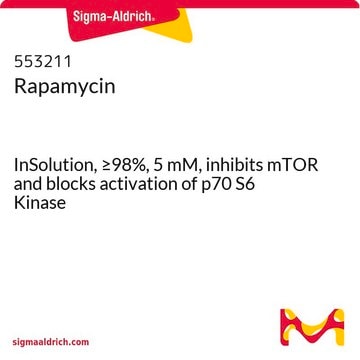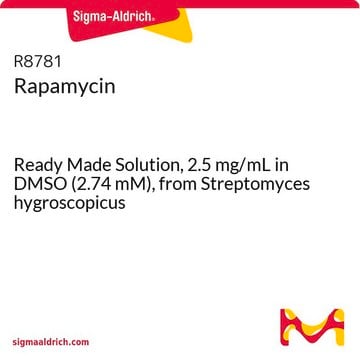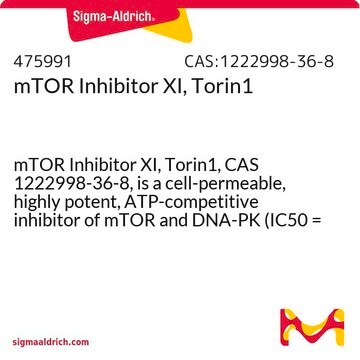553210
Rapamycin
≥95% (HPLC), powder
Sinónimos:
Rapamycin, mTOR Inhibitor I
About This Item
Productos recomendados
Quality Level
assay
≥95% (HPLC)
form
powder
manufacturer/tradename
Calbiochem®
storage condition
OK to freeze
color
clear
solubility
DMSO: 200 mg/mL
ethanol: 50 mg/mL
shipped in
ambient
storage temp.
−20°C
General description
Biochem/physiol Actions
Mammalian target of rapamycin (mTOR)
Warning
Reconstitution
Other Notes
Powell, D.J., et al. 2003. Mol. cell Biol.23, 7794.
Braun, W., et al. 1995. FASEB J.9, 63.
Nielsen, F.C., et al. 1995. Nature 377, 358.
Aagaard-Tillery, K.M. and Jelinek, D.F. 1994. Cell. Immunol. 156, 493.
Gottschalk, A.R., et al. 1994. Proc. Natl. Acad. Sci. USA91, 7350.
Morice, W.G., et al. 1993. J. Biol. Chem.268, 3734.
Terada, N., et al. 1993. J. Biol. Chem.268, 12062.
Kuo, J., et al. 1992. Nature 358, 70.
Price, D.J., et al. 1992. Science257, 973.
Heitman, J., et al. 1991. Science253, 905.
Kay, J.E., et al. 1991. Immunology72, 544.
Schreiber, S.L. 1991. Science251, 283.
Bierer, B.E., et al. 1990. Proc. Natl. Acad. Sci. USA87, 9231.
Dumont, F.J., et al. 1990. J. Immunol.144, 251.
Legal Information
signalword
Warning
hcodes
Hazard Classifications
Carc. 2 - Repr. 2
Storage Class
11 - Combustible Solids
wgk_germany
WGK 2
Certificados de análisis (COA)
Busque Certificados de análisis (COA) introduciendo el número de lote del producto. Los números de lote se encuentran en la etiqueta del producto después de las palabras «Lot» o «Batch»
¿Ya tiene este producto?
Encuentre la documentación para los productos que ha comprado recientemente en la Biblioteca de documentos.
Los clientes también vieron
Artículos
AldeRed™ 588-A detects ALDH activity in cancer stem cells, aiding in cancer research.
AldeRed™ 588-A detects ALDH activity in cancer stem cells, aiding in cancer research.
AldeRed™ 588-A detects ALDH activity in cancer stem cells, aiding in cancer research.
AldeRed™ 588-A detects ALDH activity in cancer stem cells, aiding in cancer research.
Nuestro equipo de científicos tiene experiencia en todas las áreas de investigación: Ciencias de la vida, Ciencia de los materiales, Síntesis química, Cromatografía, Analítica y muchas otras.
Póngase en contacto con el Servicio técnico











